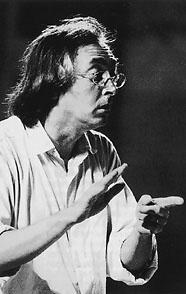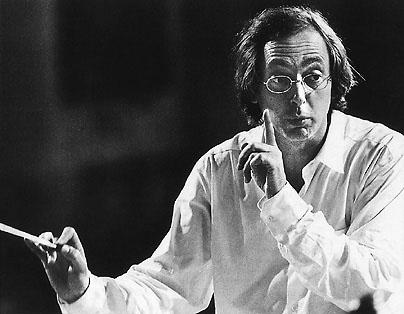Philippe Herreweghe - Interview by Philip Anson
/ November 1, 1997
Version française...
 Fifty-year old Flemish conductor Philippe Herreweghe is a
founding father of the baroque authentic practice, original
instrument movement and one of harmonia mundi's most prolific
recording artists, with over sixty albums to his name. His early
training as a chorister and assistant choirmaster in a Jesuit school
was complemented by piano studies at the Ghent Conservatory. At
university Herreweghe studied psychiatry and formed a 12-person
choir devoted to the revolutionary performing practices of Gustav
Leonhardt, Ton Koopman and the Kuijken brothers. In 1970 Herreweghe
gave up medicine, and his choir took the professional name it bears
to the present day, Collegium Vocale. Fifty-year old Flemish conductor Philippe Herreweghe is a
founding father of the baroque authentic practice, original
instrument movement and one of harmonia mundi's most prolific
recording artists, with over sixty albums to his name. His early
training as a chorister and assistant choirmaster in a Jesuit school
was complemented by piano studies at the Ghent Conservatory. At
university Herreweghe studied psychiatry and formed a 12-person
choir devoted to the revolutionary performing practices of Gustav
Leonhardt, Ton Koopman and the Kuijken brothers. In 1970 Herreweghe
gave up medicine, and his choir took the professional name it bears
to the present day, Collegium Vocale.
I spoke with Maestro Herreweghe in October at New York's
Metropolitan Museum of Art before a performance of Mahler's Das
Lied von der Erde with the St. Luke's Chamber Ensemble. As we
sat down in the green room, a stagehand brought Herreweghe a soda
and the Maestro praised New Yorkers for their friendliness. "So
different from Paris", he added with a naughty smile.
SM: Do you come to the United States often ?
-I've been here a couple of times with the Orchestra of St.
Luke's and with my European groups, but touring in America is
financially very difficult, which is a pity because I love the
country.
SM: Have you ever performed in Canada?
-Once, long ago. However, in a few days we are taking the
Mahler to Toronto ... Toronto is in Canada, isn't it?
SM: What is the Herreweghe philosophy on original instruments
and authentic performance?
- The big debate today over authentic performance of
nineteenth-century music such as Beethoven and Schumann on period
instruments is exactly the same as it was twenty years ago about
baroque music. Some of the same critics are even using the same
objections they used back then. At the beginning of the baroque
movement we defended the position that baroque music, for example a
Bach cantata, should be given a chance to be musically convincing in
its original form and on its own merits. First of all, that means
respecting each instrument's fundamental character, le sens même
de l'instrument. One of the problems we encountered was the
disappearance of boys' choirs such as Gustav Leonhardt and I used
for the Bach cantatas on Telefunken. In the old days no one had
cars, so boys went to church on Sunday and learned to sing. Today
families spend the weekend at the beach and there are no more boys'
choirs, so we have to use a mixed choir.
SM: What is the relationship between your many orchestras?
- I give one third of my time to ancient music, one third of
my time to romantic music on period instruments, and one third to
modern orchestras. My groups are like a poupée russe, you
know those Russian dolls that fit one inside the other. My core
baroque instruments group for Bach and German repertoire is
Collegium Vocale. For bigger works and French baroque we enlarge it
to make La Chapelle Royale. For even bigger classical and romantic
works we add about 20 per cent more players to form the Orchestre
des Champs-Elysées. This way I can cover a large repertoire while
maintaining the organic integrity of the groups as much as
possible.
SM: Tell me about your newest group, the Orchestre des
Champs-Elysées?
- The Orchestre des Champs-Elysées was formed in 1991 to
perform nineteenth-century masses, oratorios and symphonic works. We
are a very young ensemble, and due to budget constraints we meet
only six times per year for 2-3 weeks of practice and performance.
The OCE has a stable core of musicians, which is very important to
continuity and quality. Our musicians must be hard-working and
versatile because they play on different members of each
instrumental family for Brahms, Beethoven, Mendelssohn and Berlioz -
back then instruments changed about every thirty years. Many of our
players are professionally interested in organologie. They
collect and some even build their own instruments. Marcel Ponseele,
in my opinion the best baroque oboist in the world, also plays
classical and modern oboe. Of course not every musician can do that,
and I am considering establishing specialized sub-groups within the
OCE for each style and period. Another characteristic of our
musicians is an interest in the history and culture of every musical
period. We play early music together before we play Mozart or
Beethoven. Modern orchestras are often technically brilliant and
emotionally powerful, but they may lack general culture, especially
concerning early music. How can you play Beethoven without knowing
Bach, Handel and Haydn? As I say, to know Venezuela, it helps to
know Spain. The benefit of our authentic approach to the Romantic
repertoire is obvious on our new Schumann recording. Listen to the
balance between the strings and the winds, for example. Because
authentic instruments produce fewer decibels, the winds can blow
fortissimo as Schumann indicated without covering the
strings, something impossible with a modern symphony orchestra.
SM: What is your recording routine?
-Ideally we study and rehearse for five days, then we give a
six-concert tour in Europe. Then we take a break and the next year
study and tour it again. Finally we give two concerts in the same
hall, usually in Montreux, which are recorded. That is how we
prepared all our big oratorios, the Missa Solemnis,
Mendelssohn's Elijah and L'Enfance du Christ. In
November 1997 we'll be recording Schumann's Faust Scenes and
for the first time we will have to use two different halls, which is
a bit worrisome. Normally all the recording would be at the
Concertgebouw, but they can't give us enough time, so we'll do the
main recording in an Amsterdam studio and then the two Concertgebouw
concerts will serve as a reserve.
SM: Do you ever feel you have exhausted the recordable
repertoire?
-Not at all.
With Collegium Vocale I record 2 or 3 albums of Bach cantatas each
year, and there are many more to do. With the Orchestre des
Champs-Elysées, the Chapelle Royale and Collegium Vocale we'll
continue to record Brahms, Schumann and Beethoven. We are also
re-recording Bach's B Minor Mass, and next summer we'll redo
the St. Matthew Passion. I think my early recordings twenty
years ago were fervent in a way that is hard to recapture when you
are older and wiser, but today singers are far better prepared for
period performance, and musicological advances have made us think
differently about the masterpieces. Mahler: Lieder eines fahrenden Gesellen &
Das Lied von der Erde.
St. Luke's Chamber
Ensemble
Dir. Philippe Herreweghe
Metropolitan Museum of Art,
New York.
Opening their North
American tour in the Metropolitan Museum's Grace Rainey Rogers
Auditorium, Flemish early music maestro Philippe Herreweghe led the
fourteen-member St. Luke's Chamber Ensemble in Schoenberg's
bare-bones string orchestra arrangement of Mahler's two great song
cycles. Maestro Herreweghe's authentic instrument interpretations of
Bach, Brahms, and most recently, Schumann are not very different
from Schoenberg's pared-down treatment of Mahler, so Herreweghe was
in his element conducting these hauntingly beautiful scores.
Schoenberg's reduction clears away much orchestral underbrush to
reveal the sturdy trunk and limbs of these austere impressionistic
masterpieces. The real wonder is that a handful of string and wind
instruments fortified by harmonium, piano, celeste and gong, conjure
as much Mahler magic as they do. By reducing secondary symphonic
colors to primary ones the noble, timeless narrative is thrown into
high relief. The result is sometimes ravishingly subtle, frequently
impetuous, but always impressive. The reduced orchestra also means
that the vocal lines are completely exposed. Having suffered through
too many Das Lieds in which the orchestra drowned out the
soloists (I remember how the Met Orchestra at Carnegie Hall swamped
Ben Heppner's not inconsiderable instrument), I was thrilled to hear
the words again. Tenor Thomas Young displayed a rich dark sound and
masterful interpretation. German contralto Annette Markert is a true
lieder singer. Her medium-sized, polished voice brought
memorable vulnerability to her characterizations. Baritone William
Sharp sang the four Lieder eines fahrenden Gesellen with good
German diction in a dramatic manner that somewhat compensated for a
rather average voice. This concert proved that Schoenberg's minimal
Mahler well deserves to become a staple of the chamber ensemble
repertory, as long as the soloists are of the highest quality.
-Philip Anson. The Metropolitan Museum's concert and lecture
series continues through to May 23, 1998. Highlights include
pianists Ruth Laredo, André Watts, Ken Noda, Peter Serkin, Alfred
Brendel (lectures only), András Schiff and André Previn, violinist
Young Uck Kim, the Beaux Arts Trio, Philharmonia Virtuosi, Pomerium,
Quartetto Gelato, Dawn Upshaw and the Aulos Ensemble, Chanticleer,
Anonymous Four, Wolfgang Holzmair and Bo Skovhus. Tel: (212)
650-3949. Fax: (212) 650-2253.
Version française... |
|


